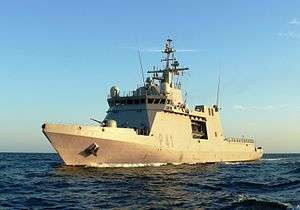ESPN Meteoro (P-41)
 Meteoro (P-41) | |
| History | |
|---|---|
| Name: | Meteoro |
| Ordered: | 31 July 2006 |
| Builder: | NAVANTIA |
| Cost: | €166.74m (US$224m)[1] |
| Laid down: | 4 October 2007 |
| Launched: | 16 October 2009 |
| Commissioned: | 28 July 2011 |
| Identification: | pennant number: P41 |
| Status: | In active service |
| General characteristics | |
| Class and type: | Meteoro class BAM |
| Displacement: | 2860 tons full load |
| Length: | 93.9 metres (308 ft) |
| Beam: | 14.2 metres (47 ft) |
| Draft: | 4.2 metres (14 ft) |
| Propulsion: |
|
| Speed: | 20 knots (37 km/h; 23 mph) |
| Range: | 3,500 nautical miles (6,500 km; 4,000 mi) |
| Complement: | 46 crew and 30 forces[2] |
| Armament: |
|
| Aircraft carried: | 1 × NH-90 |
The ESPN Meteoro (P-41) is the lead ship of the Meteoro class, a new kind of offshore patrol vessel created for the Spanish Navy and called BAMs.
Operational history
.jpg)
Its construction began on October 4, 2007 with the cutting of the first sheet[3] and the keel was placed on the stand on March 13, 2009 in the shipyard of San Fernando.
It was launched on Friday, October 16, 2009, sponsored by Minister of Economy Elena Salgado,[4] with the anecdote that the ship slid down the stage 11 minutes before the scheduled time, when the ceremony had just begun.
On Friday, January 28, 2011, it successfully completed its sea tests in the Bay of Cadiz waters, prior to its delivery to the Navy,[5] completing its last tests in July 2011. While carrying out minor repairs at the San Fernando shipyard , a soldier was found dead inside of the boat with a shot in the head.[6] He surrendered to the navy at the base of Rota in the presence of Defense Minister Carme Chacón on July 28, 2011.
Under the command of Captain David Fernández-Portal Díaz del Rio, on August 22, he arrived in the military arsenal of Las Palmas de Gran Canaria, where he remained until September 5, when he returned to the peninsula to begin the certification of his Equipment and systems. In October 2011, he traveled to Cartagena for evaluation and training of the crew, then going to Alicante, arriving on November 4, where the Prince of Asturias attended the next day At the exit of the Volvo Ocean Race, indicated by means of a cannon salvo of the Meteoro, after which it went to the city, to participate in the events of 50th edition of the Nautical Week of Barcelona. After finalizing the Nautical Week of Barcelona, went to the Naval Military School of Marín, where he arrived on 23 November to carry out various tests there, and to sail from there the next day.
It finished its cruise of resistance by the Atlantic Ocean and the Mediterranean Sea on 19 December 2011, when it arrived at its base in the Arsenal of Las Palmas, after having touched, in addition to the ports already mentioned, Lisbon, Vigo, Palma de Mallorca, Mahón And Algiers, where he was visited by 40 officers of the Algerian Navy.[7]
On June 7, he returned to his base in Las Palmas de Gran Canaria after completing his period of operational qualifications and training, now being considered as fully operational.
On July 17, 2013, he sailed from his base in Las Palmas de Gran Canaria to join Operation Atalanta to fight piracy in the Indian Ocean, replacing Numancia, in an expected deployment of four months. Between December 1 and 3, he was relieved in Djibouti by the Tornado, to begin his return journey to Spain, and arrive at his base in Las Palmas on December 22, 2013
On March 20, 2014, while participating in a routine exercise of cargo hoisting some 23 miles southwest of Fuerteventura, an Super-Puma helicopter of the Air Rescue Service of the Air Force 802 squadron crashed in the middle of an exercise. The Meteoro was able to rescue one of the 5 crew members of the aircraft.[8] On April 21, 2014, he participated in the search and rescue tasks, participating in the company Phoenix International and the bodies of two of its crew, as well as the Transfer of the aforementioned mortal remains to the Arsenal of Las Palmas.
In April 2015 he participated in the cleaning of oil spills in the Canary Islands, caused by the sinking of the Russian fishing vessel Oleg Naydenov. During the night of 16 to 17 of May, 2015 he participated in the arrest of a former fishing vessel, which carried 1800 kg of cocaine on board.
In August 2015 he joined the twenty-first rotation of the Atalanta anti-piracy operation in Indian waters. At the end of November, he set out on a return trip to Spain, calling at the ports of Dar es Salaam, Tanzania, Cape Town (South Africa) and Luanda (Angola).
Units of the class
References
- ↑ Ing, David (22 July 2014). "Two new Spanish BAM OPVs to be in service by 2019, says Navantia". IHS Jane's Navy International.
- ↑ Official Web of the Spanish Navy
- ↑ Navantia empieza mañana el corte de chapa de los Buques de Acción Marítima (spanish)
- ↑ Botadura del primer Buque de Acción Marítima de la Armada Española (spanish)
- ↑ El BAM ?Meteoro?(P-41) realiza con éxito sus últimas pruebas de mar(spanish)
- ↑ Hallado muerto un militar en un buque de la Armada en San Fernando(spanish)
- ↑ El patrullero oceánico ‘Meteoro’ finaliza su crucero de resistencia(spanish)
- ↑ Recuperan los primeros restos del helicóptero siniestrado en Canarias(spanish)